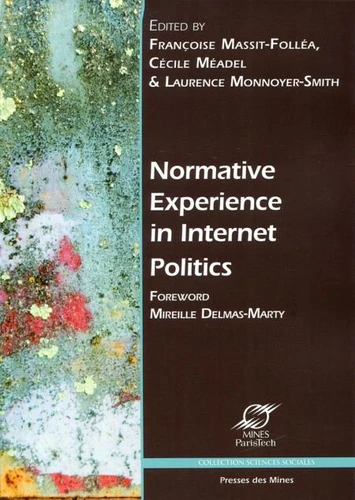Normative Experience in Internet Politics
Par : , ,Formats :
Disponible dans votre compte client Decitre ou Furet du Nord dès validation de votre commande. Le format PDF est :
- Compatible avec une lecture sur My Vivlio (smartphone, tablette, ordinateur)
- Compatible avec une lecture sur liseuses Vivlio
- Pour les liseuses autres que Vivlio, vous devez utiliser le logiciel Adobe Digital Edition. Non compatible avec la lecture sur les liseuses Kindle, Remarkable et Sony
 , qui est-ce ?
, qui est-ce ?Notre partenaire de plateforme de lecture numérique où vous retrouverez l'ensemble de vos ebooks gratuitement
Pour en savoir plus sur nos ebooks, consultez notre aide en ligne ici
- Nombre de pages266
- FormatPDF
- ISBN978-2-35671-298-1
- EAN9782356712981
- Date de parution21/09/2015
- Protection num.pas de protection
- Infos supplémentairespdf
- ÉditeurPresses des Mines - Transvalor
- PréfacierMireille Delmas-Marty
Résumé
The ways in which the Internet is managed and controlled-often labeled as Internet Governance- are usually considered as standing on four main pillars: Technology, Market Laws, State Regulation and Uses. Nevertheless, its specific features, the consequences of the plurality of norms it involves and of the decision-making processes it entails are rarely addressed in a comprehensive analysis.
This book explores the Internet's functioning both as a practical-intellectual experience and a political challenge.
By means of several case studies, it proposes a substantial and reflexive treatment of multileveled, formal or informal Internet Politics. The book's overall endeavor is to outline an understanding of what is -or may be- a "digital common good". The authors are members of a European academic team gathered by the Vox Internet research program's meetings. They adopt a multi-disciplinary approach, embedding technological innovation in the field of social sciences (communication studies, sociology, law, political science and philosophy). By Romain Badouard, Dominique Boullier, Herbert Burkert, Dominique Cardon, Mireille Delmas-Marty, Françoise Massit-Folléa, Paul Mathias, Cécile Méadel, Laurence Monnoyer-Smith, Francesca Musiani, Claudia Padovani, and Bernhard Rieder.
By means of several case studies, it proposes a substantial and reflexive treatment of multileveled, formal or informal Internet Politics. The book's overall endeavor is to outline an understanding of what is -or may be- a "digital common good". The authors are members of a European academic team gathered by the Vox Internet research program's meetings. They adopt a multi-disciplinary approach, embedding technological innovation in the field of social sciences (communication studies, sociology, law, political science and philosophy). By Romain Badouard, Dominique Boullier, Herbert Burkert, Dominique Cardon, Mireille Delmas-Marty, Françoise Massit-Folléa, Paul Mathias, Cécile Méadel, Laurence Monnoyer-Smith, Francesca Musiani, Claudia Padovani, and Bernhard Rieder.
The ways in which the Internet is managed and controlled-often labeled as Internet Governance- are usually considered as standing on four main pillars: Technology, Market Laws, State Regulation and Uses. Nevertheless, its specific features, the consequences of the plurality of norms it involves and of the decision-making processes it entails are rarely addressed in a comprehensive analysis.
This book explores the Internet's functioning both as a practical-intellectual experience and a political challenge.
By means of several case studies, it proposes a substantial and reflexive treatment of multileveled, formal or informal Internet Politics. The book's overall endeavor is to outline an understanding of what is -or may be- a "digital common good". The authors are members of a European academic team gathered by the Vox Internet research program's meetings. They adopt a multi-disciplinary approach, embedding technological innovation in the field of social sciences (communication studies, sociology, law, political science and philosophy). By Romain Badouard, Dominique Boullier, Herbert Burkert, Dominique Cardon, Mireille Delmas-Marty, Françoise Massit-Folléa, Paul Mathias, Cécile Méadel, Laurence Monnoyer-Smith, Francesca Musiani, Claudia Padovani, and Bernhard Rieder.
By means of several case studies, it proposes a substantial and reflexive treatment of multileveled, formal or informal Internet Politics. The book's overall endeavor is to outline an understanding of what is -or may be- a "digital common good". The authors are members of a European academic team gathered by the Vox Internet research program's meetings. They adopt a multi-disciplinary approach, embedding technological innovation in the field of social sciences (communication studies, sociology, law, political science and philosophy). By Romain Badouard, Dominique Boullier, Herbert Burkert, Dominique Cardon, Mireille Delmas-Marty, Françoise Massit-Folléa, Paul Mathias, Cécile Méadel, Laurence Monnoyer-Smith, Francesca Musiani, Claudia Padovani, and Bernhard Rieder.










